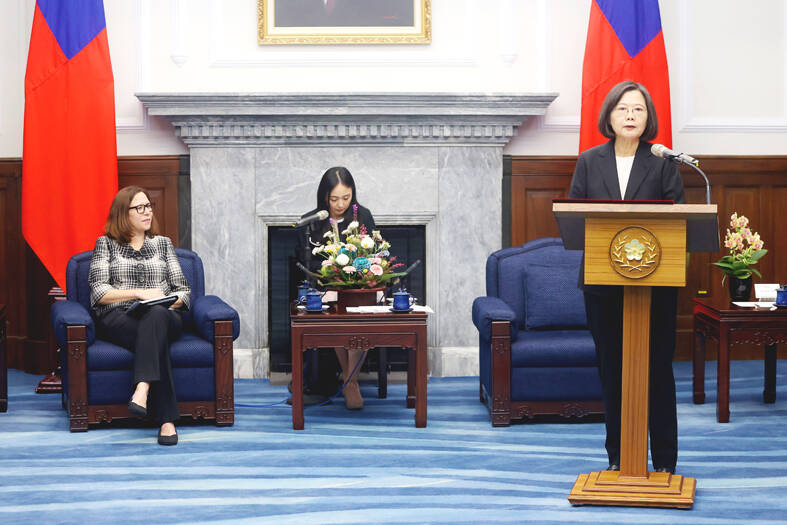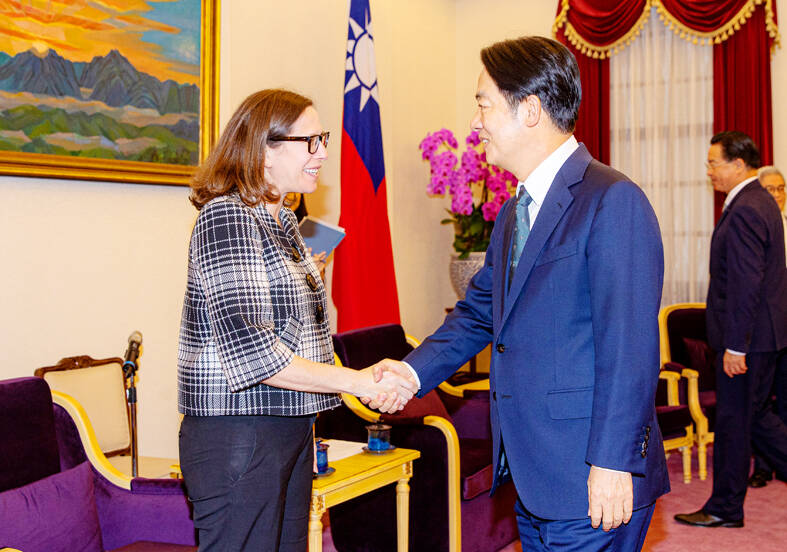American Institute in Taiwan (AIT) Chair Laura Rosenberger yesterday said during a meeting with President Tsai Ing-wen (蔡英文) that she hoped to see the US and Taiwan maintain the “rock-solid” relations they currently enjoy.
Rosenberger, who arrived on Sunday and is scheduled to leave on Saturday, would “demonstrate the United States’ strong US commitment to Taiwan and advance the growing US-Taiwan partnership,” the AIT said in a statement on Sunday.
Congratulating Taiwanese on conducting free and fair elections in January, Rosenberger said that elections in Taiwan have always been a model for the Indo-Pacific region and the world.

Photo: CNA
After the elections, Taiwan received many congratulatory messages from around the world — a recognition of the enduring strength of Taiwan’s democracy, she said.
Taiwan maintained a close partnership with the US in economics, security and people-to-people exchanges during Tsai’s tenure over the past eight years, Rosenberger said.
Noticeable recent achievements in the relationship include a memorandum of understanding on international development cooperation signed in February, as well as the fourth High-Level Dialogue on the US-Taiwan Education Initiative and the fourth US-Taiwan Consultations on Democratic Governance in the Indo-Pacific Region that were held last month, she said.

Photo: CNA
The economic ties between Taipei and Washington are always strong and continue to deepen, Rosenberger said, citing US President Joe Biden’s Trade Policy Agenda released last month, which highlights the US-Taiwan Initiative on 21st Century Trade as one of the economic visions the US government is working on.
She also said that efforts to provide double taxation relief to Taiwanese businesses and workers in the US are ongoing.
Taiwan is a beacon of democracy in the region, boasting a vibrant society, a thriving economy and world-leading technologies, Rosenberger said.
The US sees Taiwan as a crucial partner, she said, adding that safeguarding peace and stability is a goal shared by Taiwan and the US.
Washington has a “rock-solid, principled and bipartisan” commitment to Taiwan and hopes the latter will endeavor to maintain that solid relationship, she said.
Tsai thanked Rosenberger for visiting Taiwan five times since taking office in March last year, saying it “demonstrated her enthusiasm for deepening Taiwan-US relations.”
The partnership between Taiwan and the US continues to grow ahead of the 45th anniversary of the enactment of the Taiwan Relations Act on April 10, 1979, Tsai said.
Taiwan would continue to cooperate with the US and other democracies to ensure regional stability and promote global prosperity, she added.
Later yesterday, during a meeting with Vice President William Lai (賴清德), the president-elect, Rosenberger expressed confidence that Taiwan and the US would grow closer after he takes office.
Lai thanked Rosenberger for leading a delegation to Taiwan shortly after the elections to offer their congratulations and invited her to attend his inauguration on May 20.
During her trip this week, Rosenberger is also to meet with academics and politicians from across party lines to explore the possibility of collaborating on “regional security, mutually beneficial trade and investment, and people-to-people educational and cultural ties,” the AIT said.

MAKING WAVES: China’s maritime militia could become a nontraditional threat in war, clogging up shipping lanes to prevent US or Japanese intervention, a report said About 1,900 Chinese ships flying flags of convenience and fishing vessels that participated in China’s military exercises around Taiwan last month and in January have been listed for monitoring, Coast Guard Administration (CGA) Deputy Director-General Hsieh Ching-chin (謝慶欽) said yesterday. Following amendments to the Commercial Port Act (商港法) and the Law of Ships (船舶法) last month, the CGA can designate possible berthing areas or deny ports of call for vessels suspected of loitering around areas where undersea cables can be accessed, Oceans Affairs Council Minister Kuan Bi-ling (管碧玲) said. The list of suspected ships, originally 300, had risen to about 1,900 as

Japan’s strategic alliance with the US would collapse if Tokyo were to turn away from a conflict in Taiwan, Japanese Prime Minister Sanae Takaichi said yesterday, but distanced herself from previous comments that suggested a possible military response in such an event. Takaichi expressed her latest views on a nationally broadcast TV program late on Monday, where an opposition party leader criticized her for igniting tensions with China with the earlier remarks. Ties between Japan and China have sunk to the worst level in years after Takaichi said in November that a hypothetical Chinese attack on Taiwan could bring about a Japanese

The WHO ignored early COVID-19 warnings from Taiwan, US Deputy Secretary of Health and Human Services Jim O’Neill said on Friday, as part of justification for Washington withdrawing from the global health body. US Secretary of State Marco Rubio on Thursday said that the US was pulling out of the UN agency, as it failed to fulfill its responsibilities during the COVID-19 pandemic. The WHO “ignored early COVID warnings from Taiwan in 2019 by pretending Taiwan did not exist, O’Neill wrote on X on Friday, Taiwan time. “It ignored rigorous science and promoted lockdowns.” The US will “continue international coordination on infectious

DEEP-STRIKE CAPABILITY: The scenario simulated a PLA drill that turned into an assault on Taiwan’s critical infrastructure, with the launchers providing fire support Taiwan yesterday conducted this year’s first military exercises at Longsiang Base in Taichung, demonstrating the newly acquired High Mobility Artillery Rocket System’s (HIMARS) ability to provide fire support and deep-strike capabilities. The scenario simulated an attack on Penghu County, with HIMARS trucks immediately rolling into designated launch areas and firing barrages at the Wangan (望安) and Cimei (七美) islands, simulating the provision of fire support against invading forces. The HIMARS are supposed to “fire and leave,” which would significantly increase personnel and equipment survivability, a military official said. The drill simulated an exercise launched by the Chinese People’s Liberation Army (PLA) Eastern